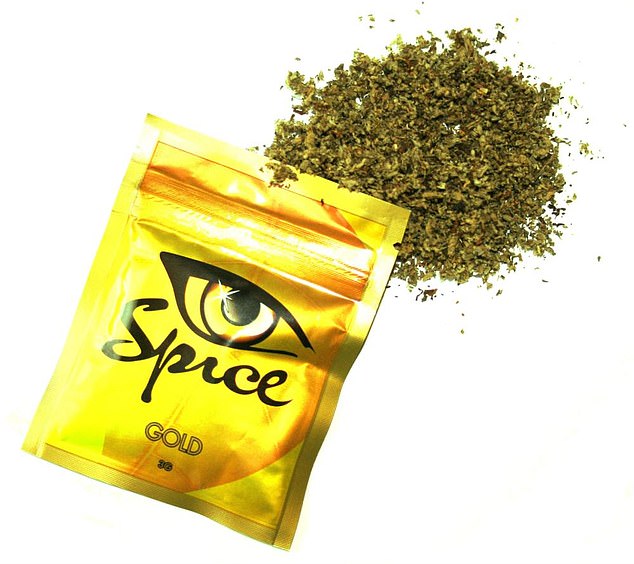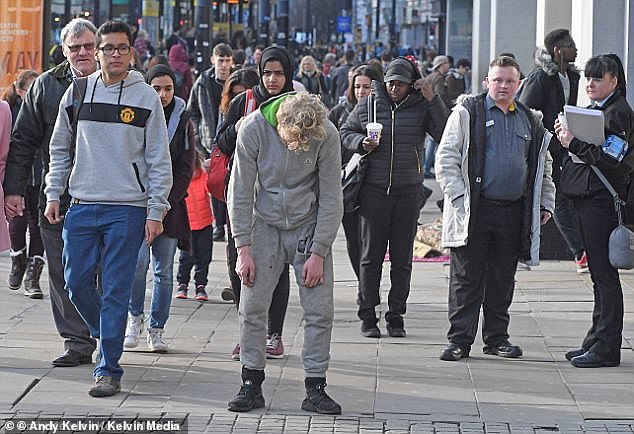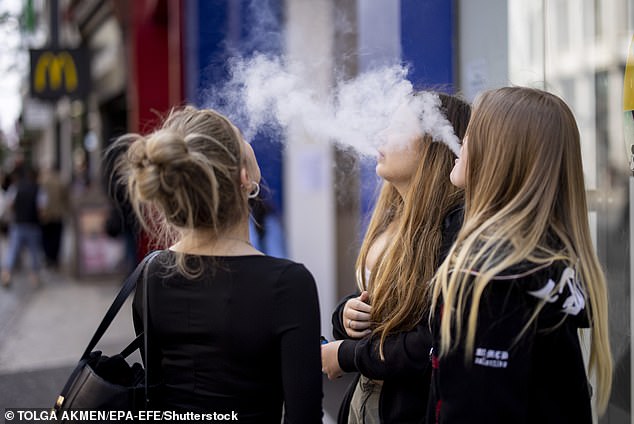One in six e-cigarettes confiscated from schoolchildren in England was laced with the “zombie drug” Spice, according to a shocking new study.
Testing of hundreds of vaping devices confiscated from 38 schools revealed the alarming prevalence of the synthetic street drug, which can cause heart attacks and strokes.
Police, schools and researchers believe the substance is being substituted in vaporizers sold as containing cannabis oil.
Professor Chris Pudney, from the University of Bath, has been testing the world’s first handheld device that instantly detects synthetic drugs.
Working with the schools and police forces involved, they tested 596 confiscated vapes and found spice in 28 out of 38 (74%) schools across London, the West Midlands, Greater Manchester and South Yorkshire.
One in six vapes confiscated from children contained Spice, prompting warnings that it could cause deaths in schools. Pictured: File image of young people vaping

Spice is a synthetic cannabinoid that can cause a variety of serious side effects, including cardiac arrest.
About one in six (16.6 percent) of the vapes contained Spice, while about one in 100 (1.17 percent) contained THC, the psychoactive component of cannabis.
As the school summer holidays approach, Professor Pudney is urging parents and carers to discuss with their children the serious health risks posed by illegal vaping.
He said: ‘Teenagers believe they are buying vapes or vaping liquid that contains THC or nicotine when in fact they are laced with Spice.
‘We know that children can suffer cardiac arrest when they smoke Spice, and I believe some have come very close to dying.
‘School principals tell me that students are fainting in the corridors and ending up spending long periods in intensive care.
‘This is not just an isolated, one-off event that happens at a school far from where you are; it is a common occurrence.
“As we approach the school holidays, if we can have an open dialogue and talk to children about the risks they face, then they will have the opportunity to make a different choice.”
Ben Davis, headteacher at St Ambrose Barlow Secondary School in Salford, invited Professor Pudney to test a batch of vapes confiscated from the school in July.

Vaping is highly addictive and potentially harmful, but when mixed with Spice, it can be extremely dangerous, experts warn

Spice is called the “zombie drug” because it leaves users in a semi-comatose, stumbling state. (Pictured: a Spice user in Manchester)
He said: ‘We have had specific cases of young people under the influence of spice. I remember one young man describing how his hands felt like they were cartoon hands. He couldn’t control them and he felt like they didn’t belong to him.
‘We also saw two children faint.
‘Dealing with the aftermath is a challenge, especially when you have to explain to the child’s family that something potentially life-threatening happened while they were in our care.
“It is equally distressing for his friends who witnessed the collapse and for the staff involved – it is their worst fear coming true.”
He added that any child who collapses in an unattended area, such as a bathroom stall, may not be discovered until it is too late.
“We’ve been lucky so far, but I think it’s only a matter of time before serious injuries or deaths occur,” he said.
‘My message to families is not to assume that their children are not involved. There is a good chance that they are or that they know someone who is. Talk to them about it.
‘Be open, non-judgemental and accepting. As soon as you judge or blame, barriers will arise and you will not be able to reach your child. This conversation is crucial for their safety.’
To help combat this problem, Professor Pudney has provided a portable spice detector to Devon and Cornwall Police.
Chief Inspector Sarah Johns said the device would help them determine the scale of the problem and allocate resources more effectively.
“Our clear message to all young people is that the risks associated with unregulated vaping are not worth it,” he said.
‘Young people who obtain these liquids, or are offered them, can never know for sure what they contain and, as Dr Pudney’s work indicates, if they are spices, this could cause serious harm.
“There is also criminality and exploitation associated with the production and distribution of vapes or liquids containing spice or THC, and we will seize them when and where we become aware of their presence.”
Professor Pudney has also trialled vapes in four schools in Greater Manchester, with oversight from Greater Manchester Police.
Detective Sergeant Laura Bell, from GMP’s Organised Crime Unit in Salford, stressed the importance of taking proactive steps to protect young people.
She said: “It is important that we take a proactive approach to keeping young people safe – we know that one of the most effective ways to do this is through education. It is vital that we engage with young people and schools in our communities to do this.”
‘Students are educated about the risks of illegal drug and vaping use, the potential impact on their health and the long-term consequences it can have on their future.
‘We encourage parents and guardians to discourage their children from engaging in any illegal activity and continue to remind them of the negative consequences that drug use can have.
‘Unscrupulous vape sellers have no place in Greater Manchester and unregulated vapes are often intentionally marketed to young people, damaging their health.
‘GMP, together with our partners, is committed to keeping illegal e-cigarettes off our streets. We will continue to take proactive measures to tackle illegal vaping products and ensure that these potentially harmful products are inaccessible to young people.
‘Our operational work has allowed us to seize countless vapes, through a combination of store visits, raids and court orders wherever we receive information.’
Experts say vapes laced with spice have caused a national problem of students becoming seriously ill in schools across the country.
In January, five children were rushed to hospital and one was left in a coma after smoking them.
The incident involved five teenagers.The man, aged between 14 and 16, was killed in Eltham, south-east London, after all of them used a refillable vape containing blue liquid in a cartridge labelled ‘Vaporesso’.
Professor Chris Pudney called on the government to prioritise the issue at a national level.
She said: ‘This issue is currently being addressed at a regional level, but I urge the government to elevate it to a national harm reduction priority.
‘I call on the Home Office and the Department for Education to highlight this issue and provide police forces and schools with comprehensive harm reduction guidance and support.’

